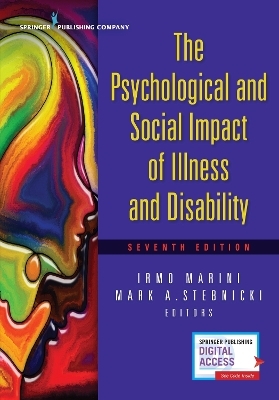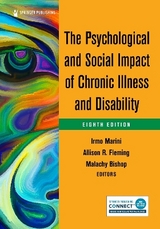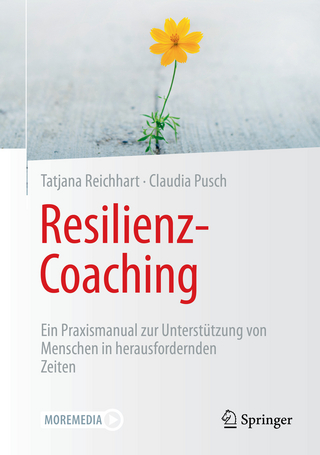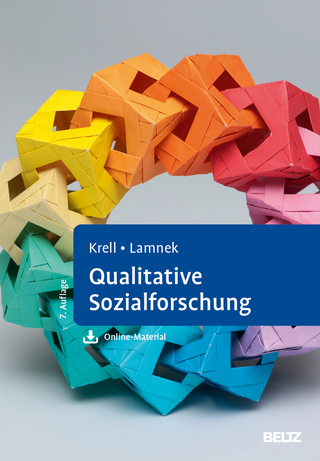
The Psychological and Social Impact of Illness and Disability
Springer Publishing Co Inc (Verlag)
978-0-8261-6161-1 (ISBN)
- Titel erscheint in neuer Auflage
- Artikel merken
Now in its seventh edition, this bestselling classic continues to be the most comprehensive and diverse text available on the psychosocial aspects of illness and disability. It is substantially revised to reflect the growing disparity between the haves and the have-nots and incorporates social justice issues throughout the text. In addition to new and updated information integrated throughout the book, the seventh edition features two new chapters addressing social justice in regards to depression and disability, and the psychosocial aspects of grief, death, and dying. Additionally, the text now includes an Instructor’s Manual and PowerPoint slides.
Combining a mix of seminal work from rehabilitation counseling legends with current theoretical and treatment approaches, the book provides a practical, real-life perspective and offers broad and inclusive coverage of the day-to-day challenges of working with a diverse and marginalized population. Additionally, the text analyzes barriers to enabling patients with disabilities and improving their quality of life. Chapter objectives, review questions, and personal narratives in each chapter facilitate in-depth learning.
New to the Seventh Edition:
Completely updated to incorporate social justice issues, from the medical and psychosocial aspects of combat trauma to the impact of mental and physical disabilities on immigrants, refugees and asylum-seekers, throughout
Includes two new chapters addressing Social Justice/Depression and Disability and the Psychosocial Aspects of Grief, Death, and Dying
Includes an Instructor’s Manual and PowerPoint slides
Enhanced coverage of topics concerning diverse and marginalized populations, including Women with Disabilities, Sexuality and Disabilities, LBGTQ Issues, Aging with Disabilities, Trauma, and more
Key Features:
Presents the most comprehensive and diverse coverage of psychosocial aspects of disability of any text
Emphasizes the negative impact of societal attitudes and treatment of disabled individuals on their psychological adjustment to disability
Examines both seminal and current thinking and treatment approaches
Provides a bridge between theory and practice with abundant narratives
Includes objectives and reviews questions in each chapter
Irmo Marini, PhD, CRC, CLCP, is Professor in the School of Rehabilitation at the University of Texas-Rio Grande Valley in Edinburg, Texas. He obtained his PhD in Rehabilitation from Auburn University and a Master’s degree in Clinical Psychology from Lakehead University in Thunder Bay, Ontario, Canada. He is a 2009 recipient of the National Council on Rehabilitation Education’s distinguished career award in rehabilitation education, and 2010 recipient of the American Rehabilitation Counseling Association’s James F. Garrett distinguished career award in rehabilitation research. In 2012, Dr. Marini was bestowed with an honorary doctorate of science (honoris causa) from his alma mater Lakehead University, and was the recipient of the 2013 National Council on Rehabilitation Education’s educator of the year award. In 2015, he was the recipient of the Patricia McCollom distinguished career award in life care planning research. He is the co-author and coeditor of seven books, over 40 book chapters, and more than 80 refereed journal publications. He is the former Chair of the Commission on Rehabilitation Counselor Certification, and former President of the American Rehabilitation Counseling Association. Mark A. Stebnicki, PhD, LPC, DCMHS, CRC, CCMC is a Professor and Coordinator of the Military and Trauma Counseling Certificate Program he developed in the Department of Addictions and Rehabilitation Services at East Carolina University. He holds a doctoral (Ph.D.) and master’s (M.S.) degree in rehabilitation counseling. Dr. Stebnicki is a Licensed Professional Counselor (LPC) in North Carolina and holds three national certifications; Diplomate in Clinical Mental Health Specialist (DCMHS) in Trauma Counseling through the American Mental Health Counselors Association (AMHCA); Certified Rehabilitation Counselor (CRC); Certified Case Manager (CCM); and a Certified Clinical Military Counselor (CCMC). In 2016, Dr. Stebnicki developed a military counseling training program for the state of North Carolina. The credential, The Certified Clinical Military Counselor (CCMC), trains professional counselors to work with the medical, psychosocial, vocational, and mental health needs of active duty personnel, veterans, and family members. Dr. Stebnicki is also certified by the Washington, D.C.-based crisis response team National Organization for Victim Assistance (NOVA) and North Carolina’s American Red Cross Disaster Mental Health crisis team. Dr. Stebnicki is an active teacher, researcher, and practitioner with over 30 years’ experience working with the mental health and psychosocial rehabilitation needs of persons that have traumatic stress, chronic illnesses and disabilities. Dr. Stebnicki has written seven books (4 edited books with Dr. Irmo Marini) most recently The Psychological and Social Impact of Illness and Disability (7th ed.) (2017, Springer Publishing) and The Professional Counselors’ Desk Reference (2016, Springer Publishing); and four single-author books, most recently Disaster Mental Health Counseling: Responding to Trauma in a Multicultural Context (2017, Springer Publishing); Empathy Fatigue: Healing the Mind, Body, and Spirit of Professional Counselors (2008, Springer Publishing). He has over 28 articles in peer-reviewed journals, and has presented at over 100 regional, state, and national conferences, seminars, and workshops, on topics ranging from youth violence, traumatic stress, empathy fatigue, and the psychosocial aspects of adults with chronic illnesses and disabilities. Dr. Stebnicki has served on multiple professional counseling and accreditation boards. He served on the crisis response team for the Westside Middle School shootings in Jonesboro, AR (March 24, 1998) and has done many stress debriefings with private companies, schools, and government employees after incidents of workplace violence, hurricanes, tornadoes, and floods. His youth violence program, the Identification, Early Intervention, Prevention, and Preparation (IEPP) Program, was awarded national recognition by the American Counseling Association (ACA) Foundation for its vision and excellence in the area of youth violence prevention. Other accolades include consulting with former President Bill Clinton’s staff on addressing the students of Columbine High School after their critical incident (April 20, 1999).
Table of Contents
Author Bio
Dedication
Preface
Part I. Historical Perspectives
Chapter 1. History of Treatment Toward Persons with Disabilities in America
Chapter 2. On the Origins of Negative Attitudes Toward People with Disabilities
Chapter 3. History of Treatment Toward Persons with Psychiatric Disabilities
Chapter 4. Models of Disability: Implications for the Counseling Profession
Chapter 5. Changes in Attitudes Toward People with Handicaps
Part II. The Personal Impact of Disability
Chapter 6. Psychological Adaptation to Chronic Illness and Disability: A Primer for Counselors
Chapter 7. Theories of Adjustment and Adaptation to Disability
Chapter 8. Psychosocial Disparities Faced by Women with Physical Disabilities
Chapter 9. Beyond the Binary: Rethinking the Social Model of Disabled Sexuality
Chapter 10. Culture, Family, and Attitudes Toward Disability
Chapter 11. Quality of Life and Coping with Chronic Illness and Disability: A Temporal Perspective
Part III. Family Issues in Illness and Disability
Chapter 12. Family Adaptation Across Cultures Toward a Loved One Who is Disabled
Chapter 13. Giving Parents a Voice: A Qualitative Study of the Challenges Experienced by Parents of Children with Disabilities
Chapter 14. Psychosocial Counseling Aspects of Grief, Death, and Dying
Chapter 15. Family Caregiving
Chapter 16. Counseling in the Context of Family Identity
Part IV. Interventions and Resources
Chapter 17. Treatment for Substance Use Disorders
Chapter 18. Working with Trauma-Related Mental Health Problems Among Combat Veterans of the Afghanistan and Iraq Conflicts
Chapter 19. Users of Assistive Technology: The Human Component
Chapter 20. Religion and Disability: Clinical, Research and Training Considerations for Rehabilitation Professionals
Chapter 21. Rehabilitation Professionals and Abuse of Women Consumers
Part V. New Directions Issues and Perspectives
Chapter 22. Application of Well-Being Therapy to People with Disability and Chronic Illness
Chapter 23. Classifying Functioning, Disability, and Health: The ICF
Chapter 24. From Empathy Fatigue to Empathy Resiliency
Chapter 25. Obesity as a Disability: Medical Psychosocial, and Vocational Implications
Chapter 26. Immigrants, Refugees, and Asylum Seekers: The Psychosocial Cost of War on Civilians
Chapter 27. Key Concepts and Techniques for an Aging Workforce
Chapter 28. Risk and Resilience in Military Families Experiencing Deployment: The Role of the Family Attachment Network
Chapter 29. Social Justice, Oppression, and Disability: Counseling Those Most in Need
Chapter 30. Reflections and considerations
| Erscheinungsdatum | 06.02.2018 |
|---|---|
| Verlagsort | New York |
| Sprache | englisch |
| Maße | 152 x 229 mm |
| Gewicht | 1060 g |
| Themenwelt | Geisteswissenschaften ► Psychologie ► Sozialpsychologie |
| Medizin / Pharmazie ► Medizinische Fachgebiete ► Psychiatrie / Psychotherapie | |
| Medizin / Pharmazie ► Physiotherapie / Ergotherapie ► Rehabilitation | |
| Sozialwissenschaften ► Pädagogik ► Berufspädagogik | |
| Sozialwissenschaften ► Soziologie | |
| ISBN-10 | 0-8261-6161-8 / 0826161618 |
| ISBN-13 | 978-0-8261-6161-1 / 9780826161611 |
| Zustand | Neuware |
| Informationen gemäß Produktsicherheitsverordnung (GPSR) | |
| Haben Sie eine Frage zum Produkt? |
aus dem Bereich



